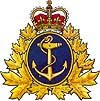
- the Cox's office (where you will get your first 2 ships crests, to be sewn on your work jacket),
- the pay office,
- sick bay,
- your Divisional Officer,
- your Divisional Chief,
- your Divisional Petty Officer,
- the stores office (where you will also draw your shipboard gear, such as war bags, life jacket, weather jacket, wet weather gear, bellaclava, sea boots, cold weather gloves...),
- the rations clerk,
- the Buffer (who is the Senior Boatswain or 'Bosun' onboard),
- the XO's office (the Executive Officer, second in command onboard),
- the ship's laundry,
- the ship's canteen and finally;
- the senior hand of your Mess (also called the Mess Mother).
Once all these signatures were acquired, the in-routine card was then presented to the Ship's Office. When you were done, you had to report back to the Cox'ns office to let him know. By this point, you had already met the major players on the ship. Certainly those who would influence your life on a daily basis. A new member is normally assigned a sponsor from his department, to show him around the ship and instruct him in shipboard routines and procedures. Dave Bell had been assigned as my 'shadow'.
There is a mind-boggling amount of information to assimilate when arriving on a Navy ship. It's a small floating town. Everything revolves around a rigid schedule, everything is timed. Rest periods, meals, returning to chores, securing for the day, calling the duty watch or any other special teams to assemble (muster)... everything is done to the shrill tune of the Boatswain's Call or whistle. When an announcement is made on the ship's broadcast system (an announcement is called a 'pipe'...), it is preceeded by the whistle which, through a series of 'pips', 'trills', 'warbles' and 'stills', announces every event. At sea, only the whistle is used. No verbalization, except in the case of a man overboard (MOB) or calling the ship's company to 'action stations'. As a new matelot, I not only had to learn to recognize these and understand them, I also had to be able to duplicate them on the whistle, for when it came my turn to stand my duty watch as Quartermaster.
While alongside in Montreal, HMCS Fraser provided manpower from several departments, to serve as escorts for the Olympic athletes. As well, there was a duty watch which provided security for the ship after working hours. Each department provided duty personnel for any given day in harbour. The Bosuns (Rope Techs, Deck Apes), the Hull Techs (Chippies), the Electricians the ETs), the Communicators (Sparkers), the Weapons Techs (Guns), the Signalmen (Bunting Tossers), the Sonarmen (Ping Bosuns), the Radar Plotters (Scope Dopes), the Marine Engineers (Stokers, Bilge Rats), the Storesmen (Storesies), the Cooks and of course, the Medical Assistants (MAs).
The duty watch is also composed of Quartermasters (2), Roundsmen (4), Corporal-of-the-Gangway (2), Officer of the Day (1), Duty Cox'n (1), Petty Officer of the Day (POOD), Master Seaman of the Watch, Duty Tech, Duty HT, Duty Engineer and Duty Storesman.
As a newcomer, I would be made to stand Jetty Sentry for my duty watches, as well as learning to ropes to become a Quartermaster. The Quartermaster is charged with the handling of the ships telecommunications system. He stands his watch at the Brow (the gangway, where one gains access to the ship from the jetty), in a little shack called the QM's Lobby. There he answers the ship's telephone system, receiving both external calls to the ship and internal calls from ship's company members who either want special pipes made, or seek to inform the brow staff or Officer of the Day (OOD) of particular goings on. Like informing the brow that they are recirculating JP-5 fuel, which calls for restrictions to smoking throughout the ship. Or to announce that a person is going aloft in the ship's mast, which necessitates a number of safety precautions being taken.
There are a list of normal daily routine pipes which must be learned and memorized. There is a very important list of emergency pipes which must be learned as well. Mistakes when making these pipes, are not an option. Confusion while broadcasting an emergency situation, such as a fire, a flood or a casualty, can lead to a very bad outcome. Add to that the fact that they are made over the upper deck speakers, so everyone in the dockyard can hear you... Messing up a pipe is not something you can hide. If you screw up, EVERYONE knows about it and are merciless in their reminding you of same. And then of course, there is always that dreaded call from the Cox'n's office to anticipate.
Example: "Prudhomme!!!! Would you kindly tell me what the $#&* was going through your vacuous @$#?%&* mind when you decided to butcher the "Hands to dinner" pipe??? Are you some sort of 'special needs' kid?? Are you one of "Jerry's Kids", fer Chrissakes??? A *#%$?* retarded babboon could have done a better job, if he had been beaten unconscious with large, spiked @%$#*& clubs!!! GET IT RIGHT or so help me GOD when we get to the next foreign port, you're not going to see even so much as a blade of $@#?*& grass ashore!!!.... CLICK!!!"
Character forming? Yes! Terror inspiring? Oh, Hell yes!!! But as I look back on it in my later years, after a long career of having served with such unique, eclectic and inspirational characters, ultimately hilarious. Every ship needs such a character. Chief Petty Officer 1st Class Bob Wibberley was more than a mere Cox'n (and there is no such thing as a 'mere' Cox'n...). Chief Wibberley was a force of nature to us, his young charges. He was a God. He was like your favorite uncle who would always know all the best stories to terrorize you with. He was loud, coarse, abrasive and larger than life. He could truly make you believe that the Navy HAD taught the Army to swear. And what I loved the most about him, he had a wicked sense of humour. He could call you down to the absolute lowest, yet in such a way that it was all you could do to contain yourself from howling with tearful laughter. He was a master of the creative insult and I would spend hours trying to commit to memory, his use of outrageously stylish invective.
My days were spent onboard, learning the ropes of the department, familiarizing myself with our radar sets and displays, the plotting tables and the myriad of other pieces of equipment we were responsible for operating. I was introduced to the wonderful world of Deck Force. Every department onboard was requirted to assign a couple of it's bodies to the ship's Deck Force. This was a manpower pool which the Bosuns controlled. They were responsible for ship's husbandry in port and at sea. Ship's husbandry, is the process of taking care of a ship, so that she always looks her best. Scraping, priming, painting, polishing the ship's upper decks and fittings, as well as the deck surfaces themselves, which on the weather decks, are surfaced with non-skid. It was idyllic... Working aboard ship, on the upper decks in the fresh air, what else could a person ask for?
My first Duty Watch saw me as a Jetty Sentry. We fell in (mustered) at the end of the working day, which was at 1600hrs. The pipe was made: "Secure... the Brow is now open! Duty Watch to muster, Quarterdeck!" Those of the ship's company who were not duty, were free to proceed ashore for the evening. Those of us who were duty that day (a duty watch lasts 24 hours), proceded to muster on the after end of the ship, on these large metal slabs which covered our triple-barreled Mk.10 ASW mortar.
http://middle-watch.com/images/Weapons/limbo-mortar.jpg
There were 4 of us Jetty Sentries and we were to stand 4-hour watches patrolling the jetty. We were briefed on our responsibilities and the ROEs (Rules of Engagement), noted our watch hours, issued a PRC, an armband, a Browning 9mm pistol and webbing and a whistle. Our mission, to rove the jetty, belay people meandering about, check their credentials, look for any signs of suspicious activity and generally ensure our area remained secure. Off I went... I ran my weapons training through my head and put on my best war face.
As I stood my watch, I thought about the days when I would hang around these docks as a civilian. I never would have seen myself here today. But I had arrived. I represented not ony my country, but my ship as well. I would occasionally cross paths with officers returning from a run ashore, to either Fraser, Skeena or Protecteur. I would salute them smartly, bidding them a good evening and carrying on with the sweep. One of them called me over. He was a two-and-a-halfer (a Lieutenant-Commander) and as I later discovered, our Combat Officer. "What's your name, Sailor?"
- "Ordinary Seaman Prudhomme, Sir!"
- "You gonna keep us safe, are you Prudhomme?", he smiled.
- "Absolutely, Sir!", I replied.
- "Very good", he said. "I'll undoubtedly sleep better tonight...". And off he went to the ship.
I wasn't sure if he was shining me on or if he actually meant that, seeing that I probably came across as a real keener. Either way, I was bound and determined to make sure nothing went awry on my watch. If anything happened, I would deal with it, raise the alarm and secure the area. Every now and then the PRC would crackle to life and the voice of the Corporal-of-the-Gangway would come across. He would ask if I had anything to report and I would respond that no, everything was quiet.
I spent the evening running every possible scenario through my head, in which I might be authorized to use deadly force. After all, if you're not ready for it, how will you react if faced with it? It's all about the training and the conditioning. Blessedly as it turned out, the 1976 Montreal Olympics went off without a hitch... Romania's Darling, Nadia Comenici captured the hearts of the world and made Olympic history, by earning the first-ever score of 10 for her uneven parallel bars routine. She would carry on to be awarded seven such scores during the games. The only truly negative aspect of the Olympics that year, were the millions of dollars in deficit that the games occasioned for Montreal itself. A debt the grandchildren of people my age, are still paying on today.
















No comments:
Post a Comment